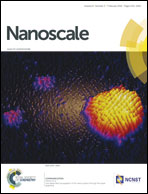“Dirty nanostructures”: aerosol-assisted synthesis of temperature stable mesoporous metal oxide semiconductor spheres comprising hierarchically assembled zinc oxide nanocrystals controlled via impurities†
Abstract
Structural disintegration or the loss of accessible surfaces of functional nanostructures due to processes involving mass transport (e.g. sintering) is a serious problem for any application of these materials at elevated temperatures, like in heterogeneous catalysis or chemical sensing. Phases with low sintering temperatures, e.g. some metals or metal oxides like zinc oxide (ZnO), are very sensitive in this respect. Therefore, it is not only relevant to prepare important materials with refined morphologies, but the desired features need to be stable under real conditions. In this study, we describe the preparation of mesoporous ZnO nano-/microspheres by means of a template-assisted aerosol technique. Furthermore, by intentional introduction of impurity elements as dopants, specific surface areas and porosities of the prepared materials can be increased significantly. The impurities also strongly improve the thermal stability of the described ZnO nanostructures against thermal sintering. Although the pure ZnO material suffers from a complete loss of porosity, the structures of the impure (”dirty”) materials change only negligibly. Even at 500 °C morphology and porosity are preserved. The latter advantageous property was used for testing the novel nanocatalysts in heterogeneous catalysis.


 Please wait while we load your content...
Please wait while we load your content...